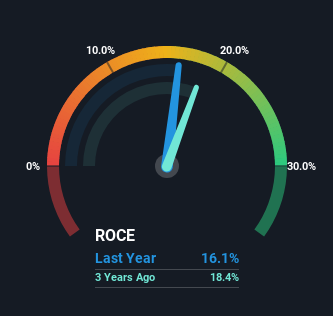Did you know there are some financial metrics that can provide clues of a potential multi-bagger? In a perfect world, we'd like to see a company investing more capital into its business and ideally the returns earned from that capital are also increasing. Basically this means that a company has profitable initiatives that it can continue to reinvest in, which is a trait of a compounding machine. So when we looked at rakumo (TSE:4060) and its trend of ROCE, we really liked what we saw.
Understanding Return On Capital Employed (ROCE)
For those who don't know, ROCE is a measure of a company's yearly pre-tax profit (its return), relative to the capital employed in the business. The formula for this calculation on rakumo is:
Return on Capital Employed = Earnings Before Interest and Tax (EBIT) ÷ (Total Assets - Current Liabilities)
0.16 = JP¥323m ÷ (JP¥2.7b - JP¥687m) (Based on the trailing twelve months to March 2024).
So, rakumo has an ROCE of 16%. That's a relatively normal return on capital, and it's around the 14% generated by the Software industry.
View our latest analysis for rakumo

Historical performance is a great place to start when researching a stock so above you can see the gauge for rakumo's ROCE against it's prior returns. If you want to delve into the historical earnings , check out these free graphs detailing revenue and cash flow performance of rakumo.
So How Is rakumo's ROCE Trending?
We're delighted to see that rakumo is reaping rewards from its investments and is now generating some pre-tax profits. The company was generating losses five years ago, but now it's earning 16% which is a sight for sore eyes. And unsurprisingly, like most companies trying to break into the black, rakumo is utilizing 1,215% more capital than it was five years ago. We like this trend, because it tells us the company has profitable reinvestment opportunities available to it, and if it continues going forward that can lead to a multi-bagger performance.
On a related note, the company's ratio of current liabilities to total assets has decreased to 26%, which basically reduces it's funding from the likes of short-term creditors or suppliers. So this improvement in ROCE has come from the business' underlying economics, which is great to see.
In Conclusion...
Overall, rakumo gets a big tick from us thanks in most part to the fact that it is now profitable and is reinvesting in its business. Astute investors may have an opportunity here because the stock has declined 32% in the last three years. That being the case, research into the company's current valuation metrics and future prospects seems fitting.
rakumo does have some risks, we noticed 2 warning signs (and 1 which is concerning) we think you should know about.
For those who like to invest in solid companies, check out this free list of companies with solid balance sheets and high returns on equity.
Valuation is complex, but we're here to simplify it.
Discover if rakumo might be undervalued or overvalued with our detailed analysis, featuring fair value estimates, potential risks, dividends, insider trades, and its financial condition.
Access Free AnalysisHave feedback on this article? Concerned about the content? Get in touch with us directly. Alternatively, email editorial-team (at) simplywallst.com.
This article by Simply Wall St is general in nature. We provide commentary based on historical data and analyst forecasts only using an unbiased methodology and our articles are not intended to be financial advice. It does not constitute a recommendation to buy or sell any stock, and does not take account of your objectives, or your financial situation. We aim to bring you long-term focused analysis driven by fundamental data. Note that our analysis may not factor in the latest price-sensitive company announcements or qualitative material. Simply Wall St has no position in any stocks mentioned.
Have feedback on this article? Concerned about the content? Get in touch with us directly. Alternatively, email editorial-team@simplywallst.com
About TSE:4060
Solid track record with adequate balance sheet.
Market Insights
Community Narratives



